

Poutama Pounamu. Education for maori. Issue 27: November 2012 / NZC Updates / Curriculum resources. Curriculum Updates support school leaders and teachers as they work to design and review their school curriculum in line with the New Zealand Curriculum and with current knowledge and understandings about effective classroom teaching.
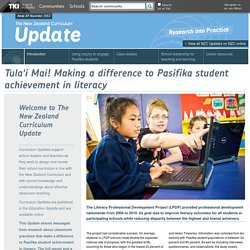
Curriculum Updates are published in the Education Gazette and are available online. This Update shares messages from research about classroom practices that make a difference to Pasifika student achievement in literacy. The full report and a summary are to be made available on the Education Counts website. The Literacy Professional Development Project (LPDP) provided professional development nationwide from 2004 to 2010. Its goal was to improve literacy outcomes for all students in participating schools while reducing disparity between the highest and lowest achievers.
The project had considerable success. Home - Pasifika. Education Council. Tapasā Poster.
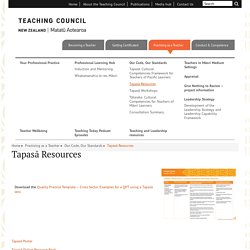
About / Te Kotahitanga - Home - Te Kotahitanga. Te Kotahitanga is a research and professional development programme that: supports teachers to improve Māori students' learning and achievement, enabling teachers to create a culturally responsive context for learning which is responsive to evidence of student performance and understandings enables school leaders, and the wider school community, to focus on changing school structures and organisations to more effectively support teachers in this endeavour.
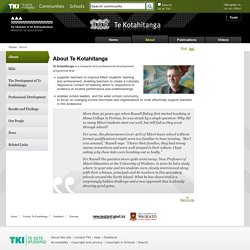
More than 30 years ago when Russell Bishop first started teaching at Mana College in Porirua, he was struck by a single question: Why did so many Māori students start out well, but still fail as they went through school? For some, the phenomenon (over 40% of Māori leave school without formal qualifications) might seem too familiar to bear scrutiny. Tapasā slide show. Home - Te Mangoroa. ICT4MLE. Cultural responsiveness. Last year, I was fortunate to go back to my home island of Atiu, in the Cook Islands.
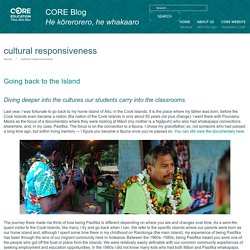
It is the place where my father was born, before the Cook Islands even became a nation (the nation of the Cook Islands is only about 50 years old plus change). I went there with Pounamu Media as the focus of a documentary where they were looking at Māori (my mother is a Ngāpuhi) who also had whakapapa connections elsewhere, and, in my case, Pasifika. Pond - Culturally responsive practice. Ministry of Education Library login. “10 ways to teach me” – Brigham Riwai-Couch.
Justice Joe Williams, Te Ritorito 2017: 'The Treaty of Waitangi and whānau, hapū and iwi wellbeing' 12651977 Huakina Mai Full. 12651977 Huakina Mai Full. 12652541 Macfarlane S. (2014) 15 August Presentation. What is MULTICULTURALISM? What does MULTICULTURALISM mean? MULTICULTURALISM meaning. What is BICULTURALISM? What does BICULTURALISM mean? BICULTURALISM meaning & explanation.
PP DLE Cultural Relationships. Unconscious bias and education. How Culture Drives Behaviours. View of The hikairo rationale teaching students with emotional and behavioural difficulties: A bicultural approach. Building Cultural Competence. HePiringaWhanauFinalWeb. AngusMacfarlaneCreatingCulturallySafeLearningEnvironments.
Principles / RTLB Practice / Professional practice / Home - Resource Teacher: Learning and Behaviour. There are eight principles guiding RTLB practice: 1.
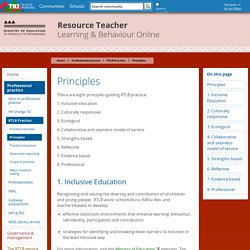
Inclusive education 2. Culturally responsive 3. 4. 5. 6. 7. 8. 1. Recognising and valuing the diversity and contribution of all children and young people. Effective classroom environments that enhance learning, behaviour, self-identity, participation and contribution strategies for identifying and breaking down barriers to inclusion in the least intrusive way. For more information, visit the Ministry of Education websites. 2. New Zealand communities are diverse, with many different cultures, ethnic, religious and socio-economic groups. The RTLB service supports the identified needs of students in their communities by: appreciating the diversity that individual RTLB bring to their cluster increasing the cultural competence of the RTLB workforce.
RTLB practice will: This principle places importance on cultural knowledge and understanding and the right of Māori to define, protect, promote and control all their tāonga and resources. 1. Final JELP & P Berryman Eley Ford Egan 58 70. The educultural wheel copy. Winners – The Prime Minister's Education Excellence Awards. Te Tiriti o Waitangi – living the values. We all know the importance of reflecting the principles of the Treaty of Waitangi in the classroom, but what exactly does this mean and how do we know if we’re getting it right?
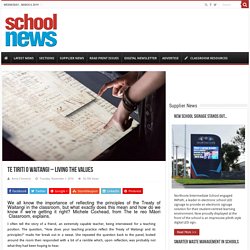
Michele Coxhead, from The te reo Māori Classroom, explains. I often tell the story of a friend, an extremely capable teacher, being interviewed for a teaching position. The question, “How does your teaching practice reflect the Treaty of Waitangi and its principles?” Made her break out in a sweat. She repeated the question back to the panel, looked around the room then responded with a bit of a ramble which, upon reflection, was probably not what they had been hoping to hear.
Tikanga - Maori Customs and Traditions @ maori.org.nz. Tikanga are the customs and traditions that have been handed down through the passages of time.
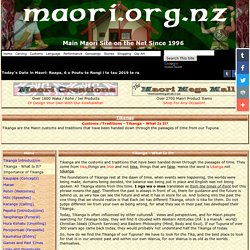
They come from tika,things are true and not teka, things that are false. Hence the word is tikanga not tekanga. The foundations of Tikanga rest at the dawn of time, when events were happening, the worlds were being made, domains being decided, the balance was being put in place and English was not being spoken. Whare Tapa Wha: A Mäori Model of a Unified Theory of Health. Macfarlane_Chapter5_Inclusion_and_Maori_Ecologies.pdf. Tataiako. Te Kotahitanga - Home - Te Kotahitanga. Implications of using restorative justice practices in schools to restore broken relationships. From the rākau to the ngākau: Exploring authentic approaches to leadership, policy, and pedagogy – Ipu Kererū. What will it take to make a difference for learners of te reo Māori? – Ipu Kererū.